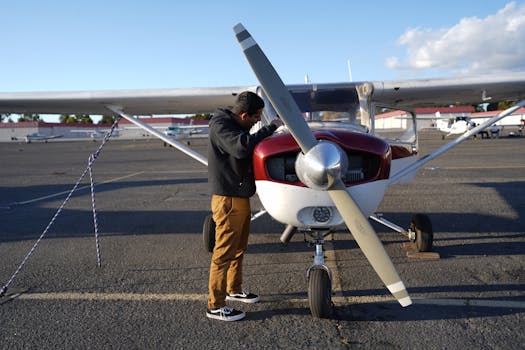You can do a security first line manager advanced apprenticeship.
Entry requirements
Most people following this route have:
- experience in related work
An Airport Operations Manager is responsible for ensuring the smooth and safe running of all daily activities at an airport. This includes overseeing passenger services, security, baggage handling, airside and landside operations, and emergency response procedures. The role involves managing teams, coordinating with airlines and government agencies, and ensuring compliance with strict aviation regulations. Operations Managers must be able to think quickly, solve problems, and handle stressful situations, especially during busy travel periods or emergencies. They may work irregular hours, including nights and weekends, to ensure 24/7 airport operations.

Airport Operations Managers in the UK typically earn between £35,000 and £65,000 per year, with salaries at major airports sometimes exceeding £75,000.
There are over 40 commercial airports in the UK, each employing operations management staff.
The demand for airport operations professionals is expected to grow by approximately 6% between 2022 and 2027, according to the UK Civil Aviation Authority.

Oversees the daily activities on the airfield, including aircraft movements, runway inspections, and safety compliance.

Manages the smooth running of airport terminals, including passenger flow, security processes, and customer service operations.

Coordinates ground handling teams responsible for baggage handling, aircraft turnaround, and refuelling operations.
Achieve at least 5 GCSEs at grades 4-9, including English and Maths.
A good foundation of GCSEs is essential for progressing onto further education required for a management role in airport operations. Subjects like geography, business studies, and IT can also be useful.
Study for A-levels or a relevant Level 3 qualification, such as a BTEC in Travel and Tourism or Business.
A-levels in business, geography, or travel and tourism, or a vocational course, will help you gain knowledge relevant to airports and management. These qualifications are often required for university or higher apprenticeships.
Complete a degree in aviation management, transport management, business, or a similar field, or undertake a higher apprenticeship in aviation operations management.
Many airport operations managers have a university degree or have completed a higher-level apprenticeship. Courses may include modules on air transport, operations, safety, and logistics. Apprenticeships combine practical experience with study.
Apply for roles such as customer service assistant, operations assistant, or security officer at an airport.
Working in different departments will give you an understanding of how airports function. Entry-level experience is important for learning about airport safety, security procedures, and customer service.
Progress into positions with more responsibility, managing small teams or specific areas of airport operations.
Supervisory roles help develop leadership, decision-making, and communication skills. You may be responsible for staff rotas, problem-solving, and ensuring compliance with regulations.
Complete management courses or professional development in areas such as health and safety, crisis management, and leadership.
Many airports offer internal training or sponsor staff for external management qualifications. Courses can cover emergency planning, people management, and regulatory compliance.
Regularly update your knowledge of UK Civil Aviation Authority (CAA) and International Civil Aviation Organization (ICAO) regulations.
Staying informed about changes in safety, security, and operational standards is crucial. Attend industry events, read relevant publications, and consider joining professional bodies like the Airport Operators Association.
Highlight your experience, qualifications, and management skills when applying for airport operations manager vacancies.
Include examples of crisis management, leadership, and regulatory compliance in your application. Tailor your CV to each job and be ready to discuss your experience in interviews.
Demonstrate your expertise, leadership skills, and understanding of airport operations during interviews.
Use real examples from your experience to illustrate your ability to handle complex situations. Show your commitment to safety, security, and customer service.
Explore relevant apprenticeships that can help you kickstart your career in Airport Operations Manager. Apprenticeships offer hands-on experience and training while earning a wage.
This page showcases various career options and the pathways to reach them. Each career listed here shares transferable skills and knowledge, making it easier for individuals to transition between them.
Your current career is highlighted to help you see how it fits into the broader landscape of potential career choices. By clicking on any career, you can learn more about it, including the training and education required to pursue it.
Remember, progressing in your career often involves further learning and training. This page provides insights into future career options as well as those that can lead up to your current one.
These career progression decisions are informed by comparing the skills and knowledge needed for different occupations, along with data on how people move between them. Explore the possibilities and discover the exciting journey ahead in your career!
An Airport Operations Manager is responsible for ensuring the smooth and safe operation of airport activities, which includes overseeing security procedures and staff. Similarly, a Security Manager supervises security protocols, manages security teams, and ensures safety standards are maintained, making this role closely aligned in terms of skills and responsibilities.
You can get into this job through:
You can do a security first line manager advanced apprenticeship.
Most people following this route have:
You can start as a security officer and become a team supervisor. You can then move into security management through on-the-job training and promotion.
You can apply directly for security management jobs if you've got previous experience in the security industry. You'll also need a Security Industry Authority (SIA) licence.
Skills gained through experience of managing a team in organisations like the armed forces, police or prison service may also be useful.
you'll need a Security Industry Authority (SIA) licence for agency and contractor jobs
You can join the International Professional Security Association for training and development opportunities.
Explore other careers or use our AI to discover personalised paths based on your interests.
Address
Developing Experts Limited
Exchange Street Buildings
35-37 Exchange Street
Norwich
NR2 1DP
UK
Phone
01603 273515
Email
[email protected]
Copyright 2026 Developing Experts, All rights reserved.
Unlock expert-designed lessons, resources, and assessments tailored for educators. No credit card required.
Claim Your Free Trial →